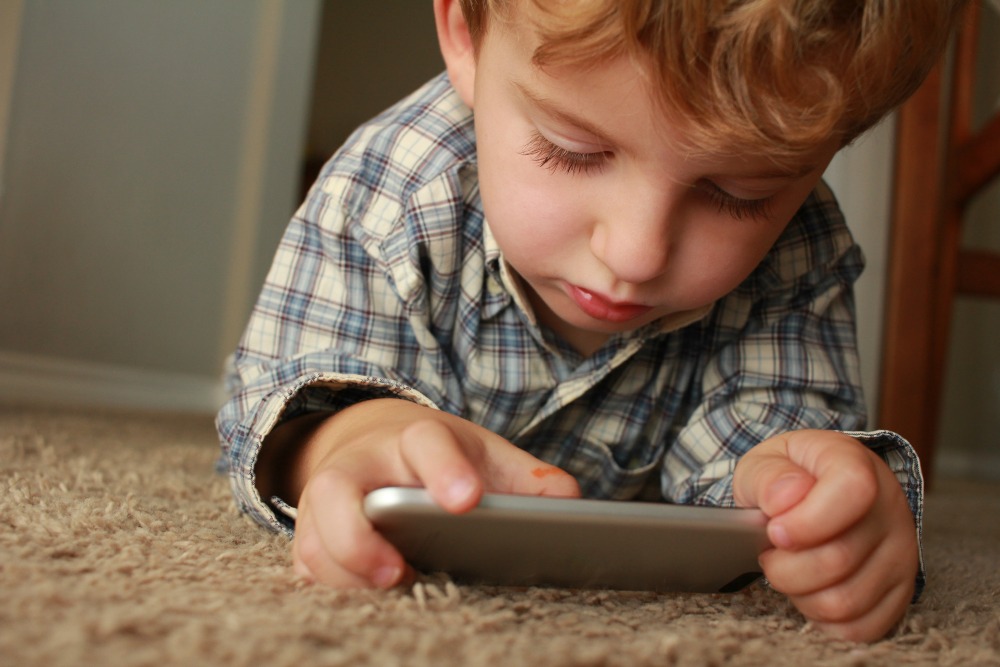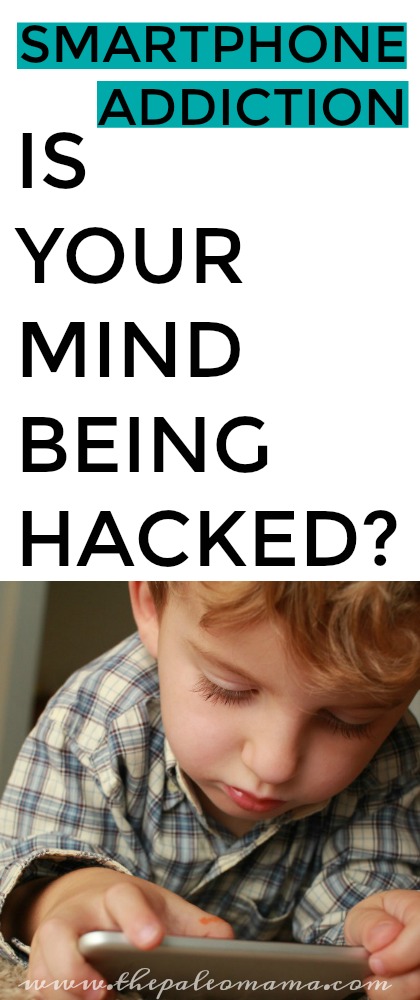It’s hard to walk into a crowd anywhere without quickly noticing that nearly 85–95 percent of the people in that crowd are using their smartphones. Today’s technology—including Google, Twitter and Facebook—has become so addictive that a phenomena called “continuous partial attention” is severely limiting people’s ability to focus, and possibly lowering IQ. Smartphone addiction is a real thing and it’s affecting families all over the world.
Let’s get it closer to home—how has smartphone usage affected you and your family members? Let’s be honest here. I know for me and Frank and our little family, we have had to actually set up parameters for each family member that keep us off the smartphone and interacting in a much more meaningful way with each other. We even got extreme a few years back and completely got rid of our iPhones for a few years. You can read about that story here. We also have the Moment APP on our phones to keep track of how much time we are on it. And I am using a few of these apps that help control screen time on each of your family’s devices.
A few statistics about smartphone addiction:
Let’s look at just a few of the current statistics about smartphone usage:
- The average person checks a cellphone 110 times a day.
- 40 percent check their cellphones on the toilet.
- 1 in 5 people ages 18-34 have used their smartphones during sex.
- 61 percent sleep with their phones turned on under a pillow or next to bed.
- 77 percent of parents and teens have argued about smartphone usage.
- 26 percent of car accidents are caused by phone usage (source).
Has Your Mind (or your kid’s mind) Been Hijacked?

Just how serious is your smartphone addiction? We all would find it hard to live without the convenience of having a cellphone. Today’s cellphones are the one miraculous device that handles all the things that used to require the use of as many as six or seven separate devices. But unfortunately, the real danger is when you find yourself using your phone to the exclusion of interaction with others. At that point you are becoming a smartphone addict. Take the “Are You a Phone Addict?” Test here to see where you fit in.
Smartphone addiction has a scientific name—Nomophobia, the fear of being without your smartphone. Nomophobia has some serious consequences, including:
- You’re wasting time.
- You become more anxious.
- You don’t sleep as well.
- Your kids pick up your naughty phone habits.
- Chemical imbalances in the brain (source)
This last consequence is probably the one that we fear the most. It’s hard to get some teens (or ever preteens) to put down their phone long enough to share a meal together as a family. Children are learning that always being connected is normal—and therefore missing out on the importance of human-to-human interaction.
How to End Your Smartphone Addiction
You can research this topic and find many resources that will help you find practical ways to end the addiction to your cellphones. I want to highlight a 5-step plan suggested by Dr. Axe. Whether you use this plan or a different one, it may be time to take action to reduce the smartphone addictions in your family’s life.
1. Turn off your cell phone at least an hour before bed.
Give your brain a chance to unwind and commit to turning off your phone an hour before bedtime.
2. Stop shacking up with your phone.
Get a real alarm clock. Turn your phone completely off overnight, and don’t turn it back on until your morning routine is finished—including morning family time.
3. Set certain times to check your phone.
Do you really need to look at every single email the second it’s receives? Give yourself a set length of time that you allow yourself to check anything work-related. I call this my “buffer” block and have a set 30-minute time in the morning and at night at that I check my email, phone, Facebook, and texts.
4. Establish phone-free zones.
Mealtimes are a good place to start. Set some good examples for your kids. And please say no to phones in bed.
5. Engage in real human contact.
Try spending some real time with your family members. Instead of “liking” a friend’s status, call that person to hear the story firsthand. Set up some coffee dates to catch up with friends. Send cards to faraway friends with a personally written cursive note (just a little homeschool mom’s ranting there).
Establish Some Quality Family Time
One of the best ways to change a bad habit is to start a good habit. I think that can apply to getting free of smartphone addiction as well. There are so many good habits we can set within our families that will communicate the value we place on each family member—and how much we value our time together.
Here are a few ideas for things you can do together that do not require any time on the cellphones.
1. Go outside.
Take a long walk together. Visit a park you’ve never visited before. Plan a weekend camping trip. Do whatever you can to immerse yourself in the outdoors. It’s a fantastic way to connect with your family. Our family spent 25 weeks last year traveling the United States, and it was the best time we had ever spent together.
2. Read together.
Reading together provides a quiet and focused atmosphere that is free of distractions.
3. Play a game.
Family board game times can be some of your children’s favorite memories. There are dozens of appropriate games from which you can choose for a few of your family’s favorite games. We love this game and learn about different herbs while we are playing.
4. Develop enriching mealtimes together.
Whether you choose a scheduled night for going out for a meal at your favorite restaurant, or schedule a night when your entire family cooks a meal together and then spends time around the table telling favorite family memories, it will be time spent that each family member will treasure.
Turn Off the Phone and Turn On the Family Time
Maybe you’ve read this article and said, “That’s not me…I’m not addicted to my phone.” Or maybe you know you are but really don’t think you can live without it. Try this 7-day digital detox!
Whichever is you, commit to taking one first step to using it less. Let that one step inspire you to take the next…and the next…until you really have discovered that some life without technology is not only possible—but downright enjoyable!
The difference between technology and slavery is that slaves are fully aware that they are not free.
—Nassim Nicholas Taleb
































